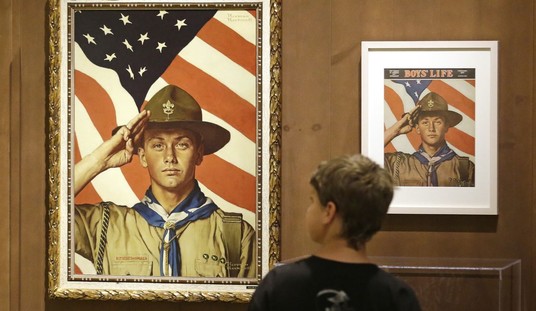Planned Parenthood certainly blusters a lot about helping women in need, but the truth is they make an awful lot of money off the grisly business of abortions. Their most recent annual report shows nearly $1 billion in assets and $997 million in revenue distributed to their local affiliates, plus another $177 million in revenue to the national office. By conservative estimates, abortions constitute 37% of Planned Parenthood’s revenue. Fair enough, I suppose, but isn’t it a little disturbing to think they have a business model (and a profit motive) that requires getting women onto the abortion tables with their feet in the stirrups?
With all the vitriol surrounding the abortion debate, it’s sometimes easy to lose sight of the fact that every day mothers with unplanned pregnancies make life-altering decisions about their unborn babies. While politicians and activists battle over the legislative issues, compassionate counselors at non-profit pregnancy resource centers (and their donors) quietly make a monumental difference in the lives of mothers, fathers, and babies every hour of every day across the United States. They literally save the lives of babies.
It’s no wonder Planned Parenthood warns women to avoid these non-profit pregnancy centers which, let’s be honest, hurt their bottom line.
Here are some things you may not know about pregnancy resource centers:
1. Pregnancy Resource Centers Outnumber Abortion Clinics
Most reports estimate there are around 2,500 pregnancy resource centers (PRCs) in the United States. But two networks alone — Care Net and Heartbeat International — boast 2,115 centers between them. A third network, Birthright International, lists six centers within 50 miles of my home in Northeast Ohio. These networks don’t include independently operated centers, so the 2,500 estimate is likely a low number.
Compare that to the number of abortion providers in the country. A website called AbortionDocs.org shows some startling statistics. Though Roe v. Wade is still the law of the land and there have already been 200,000 abortions committed this year (see the live counter here), the number of abortion clinics pales in comparison to the number of pregnancy support centers. Currently, there are only 652 surgical abortion clinics in the country and an additional 178 centers that dispense abortion pills.
When abortion proponents charge that members of the pro-life movement don’t care about women and their babies after they choose life, they’re either lying or don’t know what they’re talking about. Pro-life individuals and organizations put their time (and money) where their mouth is, providing compassionate care for mothers and their babies both before and after the birth of their children in centers that far outnumber “reproductive health” outfits.
Make no mistake — abortion mills are still “winning” the numbers game by sheer force of their factory model, having convinced two generations of women that a baby is an inconvenient “choice” that can be eliminated with a vacuum hose or, now, a pill. But day by day, woman by woman, pregnancy centers running on shoestring budgets (often staffed by tireless volunteers) are saving the lives of babies and offering hope to women with unplanned pregnancies; and in the process, they are changing the culture.
2. Pregnancy Centers Provide Free Services
Most centers provide all of their services to their clients free of charge. This may include an initial pregnancy test, counseling, and, at many centers, an ultrasound so the mother has the opportunity to see her unborn baby. And unlike abortion clinics, pregnancy centers care for the mother throughout her pregnancy and even during the child’s infancy. The centers can provide maternity and baby clothes, diapers, formula, and furniture. At most centers, the clients can earn credits to “shop” for items they need by attending childbirth and parenting classes.
Some centers operate homes for pregnant moms who find themselves homeless. In addition to taking parenting classes, the mothers learn life skills, enabling them to provide better lives for themselves and their babies.
While most pregnancy centers are not medical clinics, they have health-care providers they work with and refer to so that the woman and baby receive proper prenatal care throughout pregnancy.
One of the hallmarks of the centers is the loving, compassionate care the clients receive.
Here are some client testimonials:
“I was in your office earlier today and wanted to thank you so much for being part of such a wonderful organization that reaches out and supports mothers who need help. I felt very loved and was blown away by all the opportunities and services you provide to me…although I am no one special. I was blown away that you provide such phenomenal services to all women, but today it was very personal for me and I was thankful to have ‘googled’ free pregnancy testing and that AgapePRC came up!”
“I was a nervous wreck when I found out I was pregnant. I didn’t know if I could make it with three kids.
But at PSS everyone was supportive every step of the way with encouragement, classes, and a lot of love!
Now I’m happy and feel like I can do anything through prayer, a deep breath, and good encouraging people around me.”“My counselor didn’t do that “oh you poor baby” thing. She was patient. She wasn’t pushy. I actually trust her, which is something I never thought would happen.”
– Client J“They didn’t judge me. They just helped me see and have faith that I was not alone. There were resources to help me.” – APS Client
3. Pregnancy Centers Are Mobile
One of the most exciting developments in recent years has been the launch of mobile ultrasound units. These repurposed RVs go out into the communities, offering abortion-minded women free pregnancy tests and ultrasounds.
In 2003, Sylvia Slifko started ICU Mobile after she says the Lord gave her the idea while praying. She started with a 1986-model RV that was gutted inside which she purchased for $5,000. She put a team together, purchased an ultrasound unit at a 40% discount, and nine months later the first ICU Mobile unit was on the road. They go to shopping centers, college campuses, and other locations where young women are likely to gather. From their website:
ICU Mobile (pronounced “I See you”) is the pioneer and leader in mobile ultrasound ministry. We were the first to fully deploy, operate and execute a mobile ultrasound ministry in the United States. We currently have 12 mobile ultrasound vehicles in the United States and we are moving quickly to expand our fleet nationally and globally. Our fleet of mobile ultrasound vehicles “Go To” women and meet them where they are, where they hang out and where they live. In cities and towns, both urban and rural, across the United States and around the world, our approach is simple: reveal truth via ultrasound at a time when a woman is in the decision making process. It is our mission to provide women experiencing an unplanned pregnancy the free opportunity to verify pregnancy via a limited obstetrical ultrasound and see their unborn child in order to make an informed life-affirming decision and hear the good news of the Gospel of Jesus Christ.
They now have 24 affiliates across the country that work with local pregnancy centers, and their results are stunning—89.6% of the abortion-minded women choose life after seeing their babies on an ICU Mobile ultrasound.
An article by Robert Morrison at Family Research Council notes that Akron, where Slifko began her pro-life ministry, has historic roots in rescuing the oppressed and hurting:
America has seen this kind of dedication before. Akron, Ohio served as a center for the Underground Railroad before the Civil War. Hundreds of slaves escaped here, conducted by the courageous Harriet Tubman and others, black and white, who knew that God did not want His children to sweat out their lives in unrequited toil.
Akron is also the place where Alcoholics Anonymous was founded. This organization has given hundreds of thousands of people-in this country and elsewhere-new hope for a life free from bondage.
ICU Mobile continues the Akron tradition by offering hope and encouragement to frightened and hurting mothers and giving thousands of babies a chance to live.
The mother of the baby pictured below changed her mind about a planned abortion after seeing her baby’s waving arms on this ICU Mobile ultrasound:
4. Pregnancy Resource Centers Help Men
When people think of “crisis pregnancies” it’s understandable to think of the mothers and babies. Often men are the forgotten part of the parenting equation.
Pregnancy centers encourage men who are willing to step up and take responsibility for their children by including them in prenatal and parenting classes. But they also minister to men who come to them for healing when an abortion has caused pain in their lives, whether or not they participated in the decision. The circumstances vary: Some men are not told about the abortion until after it occurs; others pressure their partners into the decisions. Some play a supportive role by paying for the procedure and holding the girl’s hand on the way to the Planned Parenthood clinic. The reactions of the men vary as well: While some go on with life and never give it another thought, many others understand the reality that they participated in the destruction of a human life. They feel deeply the loss of their son or daughter.
Aerosmith star Steven Tyler was reportedly traumatized when he witnessed the late-term abortion of his son with his live-in teenage girlfriend Julia Holcomb in 1975. In the Aerosmith autobiography Walk This Way, Tyler’s longtime friend Ray Tabano said: “So they had the abortion, and it really messed Steven up because it was a boy. He . . . saw the whole thing and it [messed] him up big time.”
Tyler said of the experience: “It was a big crisis. It’s a major thing when you’re growing something with a woman, but they convinced us that it would never work out and would ruin our lives. . . . You go to the doctor and they put the needle in her belly and they squeeze the stuff in and you watch. And it comes out dead. I was pretty devastated. In my mind, I’m going, Jesus, what have I done?”
After years of heavy drugs, destroyed hotel rooms, and broken relationships, a married Steven Tyler, expecting a baby again, said the abortion still haunted him: “It affected me later. . . . I was afraid. I thought we’d give birth to a six-headed cow because of what I’d done with other women. The real-life guilt was very traumatic for me. Still hurts.”
And it’s no wonder. Unlike most men who simply pay the bill and walk away, Julia Holcomb, his former girlfriend, says Tyler told her he saw his son alive after the late-term saline abortion. You can hear Holcomb’s gripping account of her life with Tyler and the abortion below.
Many dads do not feel entitled to grieve the loss of their children because of the “choice” mantra that has so infused our culture. This often exacerbates the pain fathers experience as they stuff their feelings and suffer silently; many turn to drugs and alcohol or suffer from depression or other post-traumatic symptoms. Pregnancy resource centers are there to pick up the pieces, offering hope and healing for these men who are dealing with the painful consequences of abortion.
5. Pregnancy Resource Center Stories Will Warm Your Heart
Most pregnancy centers hold an annual event to raise money and highlight the great work they do. They are wonderful celebrations of life and hope, highlighting stories of mothers who chose life and want to publicly thank their counselors and the donors of the pregnancy center for—literally—saving the lives of their babies. Unless you’re a heartless Vulcan, you won’t get through the event with dry eyes as the living, breathing success stories toddle around the room and bounce on their mothers’ knees.
Watch some of the wonderful success stories below.
“I can’t imagine my life without her.”
“You don’t know what this child is going to become.”
“From the moment I chose [the adoptive parents] he was in me, but he was theirs. He was part of their family. I just kept telling myself. I’m giving them something great.
“Without the ministry and the help of the women at Arms of Love ministry, I don’t think…I’m not sure I would have Kennedy. And today, little Kennedy Grace is the highlight of my life.”
Bet you can’t watch these videos without crying:











Join the conversation as a VIP Member